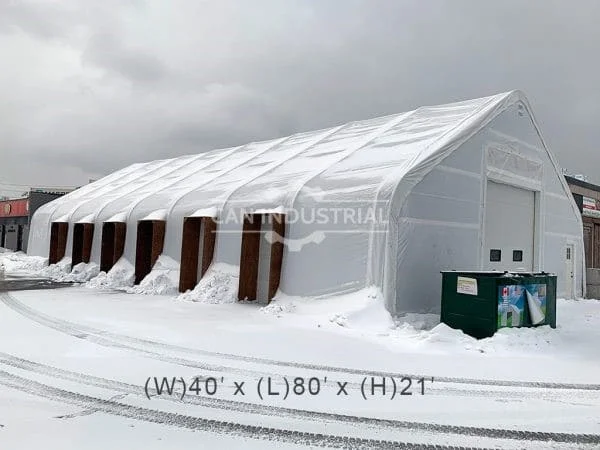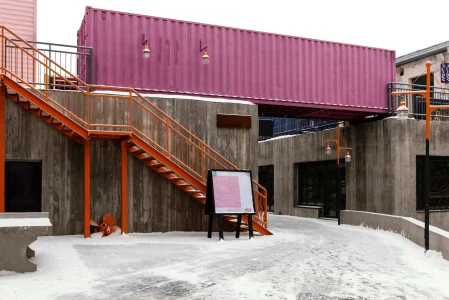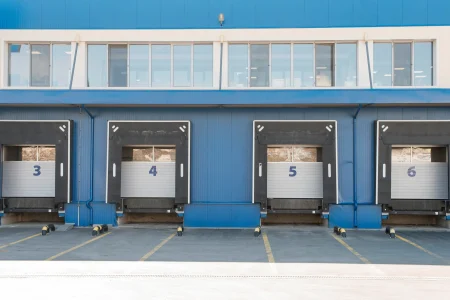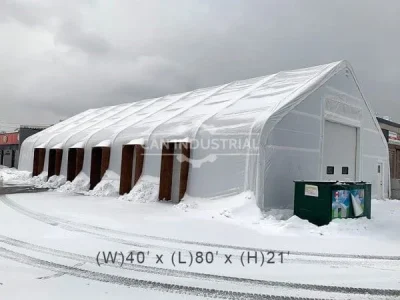Every construction or industrial site relies on organization, efficiency, and safety. Without proper storage, tools go missing, equipment gets damaged, and operations slow down. For Canadian worksites, where extreme weather and rugged conditions are part of daily life, investing in heavy-duty storage buildings is more than a convenience—it’s a necessity.
In this blog, we’ll explore why heavy-duty storage buildings are critical for Canadian worksites, what benefits they offer, and how to choose the right solution for your project.

The Importance of Storage on Worksites
On any jobsite, efficiency depends on how quickly teams can access the right tools and equipment. Without secure and organized storage:
- Workers spend valuable time searching for tools.
- Expensive machinery is left exposed to theft or damage.
- Materials deteriorate when left in the open.
- Safety hazards increase due to clutter and improper storage.
A heavy-duty storage building creates a designated space for all equipment and supplies, reducing downtime and improving productivity
Challenges Faced by Canadian Worksites
Canadian worksites face unique challenges that make strong, reliable storage essential:
- Harsh Weather Conditions: From snowstorms in Alberta to heavy rains in Ontario, weather can quickly damage exposed equipment.
- Temperature Extremes: Freezing winters and hot summers can shorten the lifespan of tools if not stored properly.
- Remote Locations: Many worksites are located in remote areas, where resupplying lost or damaged equipment is expensive and time-consuming.
- High Theft Risks: Construction sites are prime targets for theft due to the high value of tools and machinery.
Heavy-duty storage buildings offer protection against all these risks, keeping projects on track and costs under control.
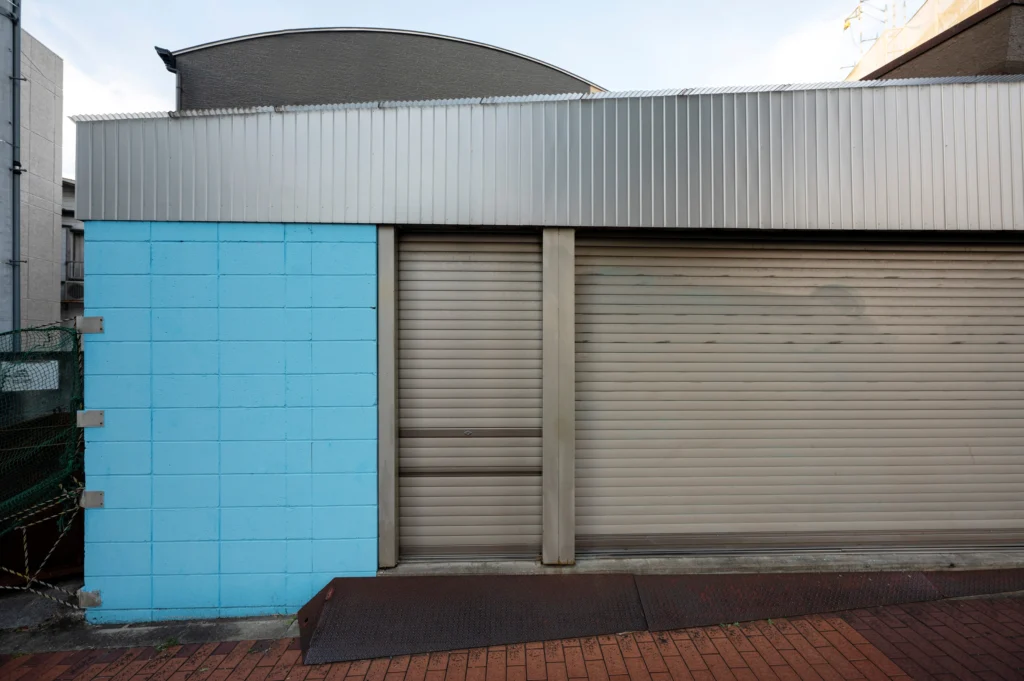
Key Features of Heavy-Duty Storage Buildings
Not all storage solutions are built the same. For Canadian worksites, heavy-duty storage buildings should include:
- Durable Materials: Steel framing and weather-resistant panels ensure longevity.
- Weatherproofing: Proper insulation and sealing to protect against rain, snow, and wind.
- Security: Reinforced locks and steel doors reduce theft and unauthorized access.
- Customizable Sizes: Modular buildings that can be scaled according to project needs.
- Easy Assembly and Portability: Prefabricated or portable designs that can be relocated as the site evolves.
Can Industrial’s range of heavy-duty storage buildings is specifically engineered with these requirements in mind, offering solutions tailored for Canadian industries.
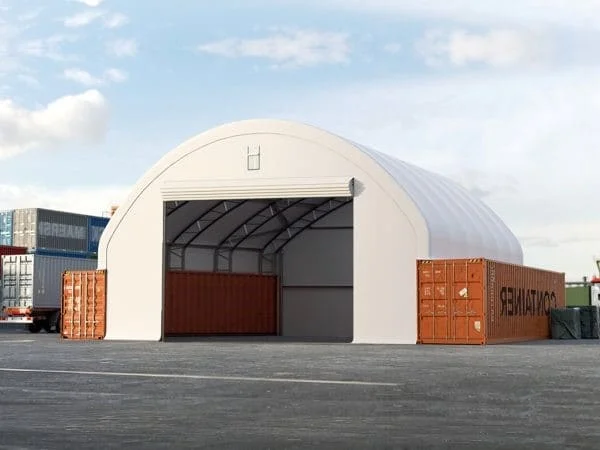
Benefits of Heavy-Duty Storage Buildings
a) Equipment Protection
Keeping tools and machines under cover prevents rust, corrosion, and mechanical failure. A small investment in storage can extend the lifespan of equipment by years.
b) Enhanced Security
With strong locks, steel construction, and limited access points, storage buildings deter theft—one of the costliest challenges for contractors.
c) Improved Productivity
Organized storage reduces wasted time. Workers know exactly where to find what they need, allowing projects to move forward without unnecessary delays.
d) Cost Savings
By preventing theft and weather damage, companies save thousands of dollars in replacement costs.
e) Compliance with Regulations
In many provinces, certain hazardous materials and tools must be stored securely. Heavy-duty buildings help meet these requirements easily.
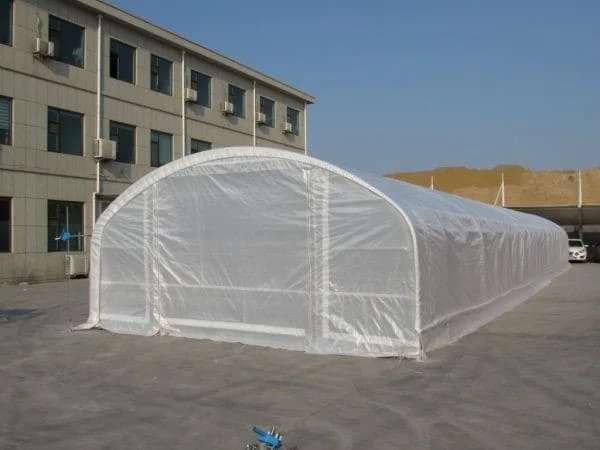
Use Cases Across Different Industries
Heavy-duty storage buildings are versatile and can be used across multiple sectors:
- Construction: Secure tools, machinery, and materials on site.
- Agriculture: Store farming equipment, feed, and supplies.
- Mining and Energy: Protect expensive machinery and hazardous materials in remote locations.
- Manufacturing: Provide storage for spare parts, raw materials, or finished goods.
- Government & Municipal Projects: Use for infrastructure, roadwork, and public works equipment.
This flexibility makes storage buildings a smart long-term investment
Comparing Heavy-Duty Storage with Traditional Options
Some contractors still rely on makeshift storage like tarps or wooden sheds. However, these options fall short in key areas:
| Feature | Tarps/Wooden Sheds | Heavy-Duty Storage Buildings |
| Durability | Weak against snow, rain, wind | Built for harsh weather |
| Security | Easy to break into | Reinforced steel doors |
| Lifespan | 1–3 years | 10+ years |
| Flexibility | Limited | Modular and portable |
| Compliance | May not meet safety codes | Designed to meet regulations |
The difference is clear: heavy-duty storage is a long-term solution that pays off quickly.
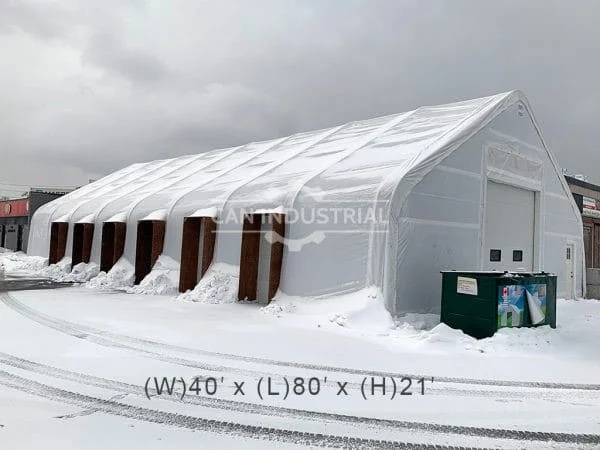
Choosing the Right Storage Building
When selecting a storage building, consider:
- Size Requirements: Calculate how much space you need for current and future equipment.
- Site Conditions: Factor in soil type, weather, and terrain.
- Mobility: Decide if you need a portable solution that can move with the project.
- Budget: Balance upfront cost with long-term savings.
- Supplier Reliability: Choose a trusted provider with proven expertise.
Can Industrial, with its track record since 2006, is a reliable partner that offers both durability and flexibility.
Best Practices for Using Storage Buildings
- Plan Layouts: Organize tools and machinery systematically for quick access.
- Regular Maintenance: Inspect locks, panels, and roofs to prevent damage.
- Access Control: Limit entry to authorized personnel.
- Climate Management: Consider insulation or ventilation if storing temperature-sensitive items.
By following these practices, companies get the maximum value from their storage buildings.
Why Can Industrial Stands Out
Can Industrial has built a reputation for delivering premium industrial solutions across Canada and the USA. Their heavy-duty storage buildings are:
- Engineered for Harsh Environments: Designed to withstand Canadian winters and rugged worksites.
- Highly Secure: Reinforced materials and lock systems deter theft.
- Customizable and Modular: Tailored to your site’s specific needs.
- Backed by Experience: Nearly two decades of expertise serving construction, manufacturing, and energy sectors.
With Can Industrial, contractors don’t just get a product—they get a trusted partner
Frequently Asked Questions
Q: Can heavy-duty storage buildings be moved to different sites?
A: Yes, many models are modular and portable, making relocation simple.
Q: Are storage buildings suitable for extreme cold?
A: Absolutely. With proper insulation and weatherproofing, they perform reliably in Canadian winters.
Q: What sizes are available?
A: Storage buildings come in various sizes, from small tool sheds to large equipment warehouses.
Q: How long do they last?
A: With regular maintenance, heavy-duty storage buildings can last 10–20 years or more.
Conclusion
For Canadian worksites, heavy-duty storage buildings are not a luxury—they’re a necessity. They provide reliable protection against theft, weather, and safety hazards while improving efficiency and compliance.
By choosing a trusted supplier like Can Industrial, companies can invest in storage solutions that offer long-term value, security, and durability. In an industry where downtime and lost equipment can cost thousands of dollars, a heavy-duty storage building is one of the smartest investments you can make.
Secure your site, protect your assets, and keep your projects on track—because every successful worksite starts with reliable storage.

